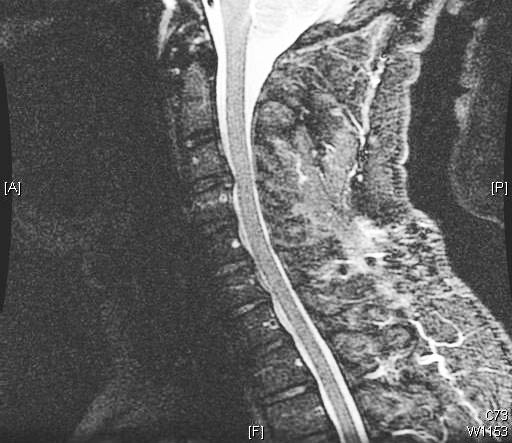Summary
Definition
History and exam
Key diagnostic factors
- spontaneous onset of neck pain
- cervical muscle pain and spasm
- headaches or occipital pain
- weakness or numbness
- presence of radiating arm pain
- reflex changes
- proximal arm weakness
- distal hand weakness
- gait ataxia
Other diagnostic factors
- cervical muscle spasm
- decreased cervical range of motion
- sensory changes
Risk factors
- age >40 years
- head or neck trauma
- previous cervical spine surgery
- previous cervical myofascial strain
- genetic predisposition
Diagnostic tests
1st tests to order
- cervical MRI
- cervical x-ray
Tests to avoid
- dermatomal somatosensory evoked potentials (SEPs)
Tests to consider
- cervical CT scan
- cervical CT myelogram
- cervical/upper extremity electrodiagnostic testing
- cervical nerve root block
Treatment algorithm
axial neck pain
cervical spondylotic radiculopathy (CSR)
degenerative cervical myelopathy (DCM)
Contributors
Authors
Dennis A. Turner, MA, MD

Professor
Neurosurgery and Neurobiology
Duke University Medical Center
Durham
NC
Disclosures
DAT is an author of a reference cited in this topic.
Peer reviewers
Ricardo Pietrobon, MD, PhD, MBA
Associate Professor of Surgery
Associate Professor in Anesthesiology
Associate Vice-Chair, Systems Integration
Department of Surgery
Duke University Medical Center
Durham
NC
Disclosures
RP is an author of a number of references cited in this topic.
Allan I. Binder, MD
Consultant Rheumatologist
Lister Hospital
East and North Hertfordshire NHS Trust
Stevenage
UK
Disclosures
AIB is an author of a number of references cited in this topic.
References
Key articles
Mazanec D, Reddy A. Medical management of cervical spondylosis. Neurosurgery. 2007 Jan;60(1 suppl 1):S43-50. Abstract
Joint Section on Disorders of the Spine and Peripheral Nerves of the American Association of Neurological Surgeons and Congress of Neurological Surgeons. Guidelines for the surgical management of cervical degenerative disease. 2009 [internet publication].
Nikolaidis I, Fouyas IP, Sandercock PA, et al. Surgery for cervical radiculopathy or myelopathy. Cochrane Database Syst Rev. 2010 Jan 20;(1):CD001466.Full text Abstract
North American Spine Society. Diagnosis and treatment of cervical radiculopathy from degenerative disorders. 2010 [internet publication].Full text
Graham N, Gross A, Goldsmith CH, et al. Mechanical traction for neck pain with or without radiculopathy. Cochrane Database Syst Rev. 2008 Jul 16;(3):CD006408.Full text Abstract
Gao F, Mao T, Sun W, et al. An updated meta-analysis comparing artificial cervical disc arthroplasty (CDA) versus anterior cervical discectomy and fusion (ACDF) for the treatment of cervical degenerative disc disease (CDDD). Spine (Phila Pa 1976). 2015 Dec;40(23):1816-23. Abstract
Reference articles
A full list of sources referenced in this topic is available to users with access to all of BMJ Best Practice.

Differentials
- Whiplash injury (cervical myofascial strain)
- Acute disk herniation
- Metastatic malignancy
More DifferentialsGuidelines
- ACR appropriateness criteria: cervical neck pain or cervical radiculopathy
- A clinical practice guideline for the management of patients with degenerative cervical myelopathy: recommendations for patients with mild, moderate, and severe disease and nonmyelopathic patients with evidence of cord compression
More GuidelinesPatient information
Back pain (lower back)
More Patient informationLog in or subscribe to access all of BMJ Best Practice
Use of this content is subject to our disclaimer

